Boiling Guitar Strings
Have you ever heard of the old trick of boiling your guitar strings? This method is used more by bass guitar players, however acoustic, lead, and rhythm guitar players have used it as well. This little trick goes back some years in the music industry, especially amongst session's players of old. When you boil a guitar string, it causes the string to expand, and thus allows the oil and dirt to be released from the string.
While boiling your guitar strings will make your old, flat sounding strings sound much better, they will not make them sound as new. This is an assumption that many make, but after 25 plus-years in the business I can tell you--this is not the case. However, boiling your old strings will make them sound much better, allowing you to get more use from them. Moreover, boiling new guitar strings before you string them on your guitar will help with the stretching process as well as allow better tone and tension.
Boiling your old, used strings can cause them to produce a much sharper, crispier, and springier tone. You will be surprised at the amount of dirt and oil you will extract from your strings in the boiling process. Once you have finished, the water in the pan will show the results. Below I will illustrate the steps and the process; but first, I will list the items you will need and how to prepare the strings.
What you will need:
- One set of new or used strings (coiled)
- One sauce pan
- Tin foil
- Regular fork
- Kitchen tongs
- A clean cloth towel
A Recipe for Better Sound
Step 1: If the strings you will be boiling are new, leave them coiled. If you are boiling old, used strings, coil them tight enough to fit in to the sauce pan.
Step 2: Fill the sauce pan with water. (Note: Many musicians use regular tap water; however, with the amount of chemicals and minerals that is found in tap water today, I use only distilled water.) Once you have filled the pan with water, place it on your stove with the burner on high.
Step 3: Once the water is boiling, carefully lay in the coiled strings in the water one at a time. (I use tongs to drop the strings in as well as remove them from the water).
Step 4: You should boil acoustic or electric guitar strings for only 3 to 5 minutes. If you go any longer than this, you risk relieving the tensile-strength of the string material. Bass guitar strings should be boiled for 10 to 15 minutes, but no more than 15 minutes.
Step 5: Once the time has elapsed, remove the strings from the water and lay them on a clean towel (Do not use paper towels). Using the towel, dry the strings thoroughly removing as much water as possible.
Step 6: Next, preheat your oven to its lowest temperature. (Shoot for approximately 200 to 225 degrees).
Step 7: While your oven is preheating, wrap the coiled strings in the tin foil (Two strings to a foil) and use the fork to perforate the foil several times. This will allow the air to circulate inside the foil, drying the strings thoroughly.
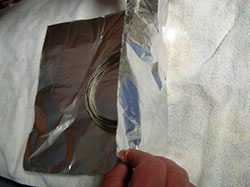 |
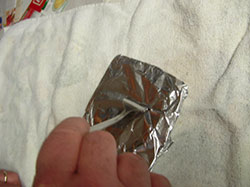 |
Step 8: Once the oven is preheated, place the strings in the oven letting them dry for 15 minutes.
Step 9: Once the elapsed time has passed, remove the strings from the oven and let them stand until they are cool to the touch.
Step 10: Restring them on your guitar.
NOTE: There are risks
There are some risks when it comes to boiling guitar strings. One such risk pertains to cheap strings. If you are using cheap guitar strings, you would be better advised to simply purchase new ones. Boiling cheap strings (with their inherently low tensile strength) will make the strings much more brittle, and thus more susceptible to breakage. Also, it is recommended that you boil your guitar strings no more than twice. If you continue to boil strings (expensive or otherwise) the tensile strength will be reduced. Also, another risk to boiling guitar strings too many times is that they will require more tension to stay in tune, possibly causing damage to the neck of your guitar.
The best recommendation is to buy good quality guitar strings, boil them only a few times when needed, and then replace them with new ones. This will keep you and your guitar sounding good while saving you some money.
Written by Keith Andrews




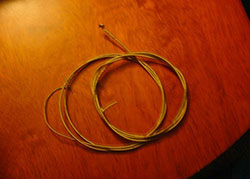
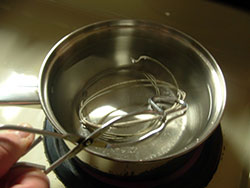
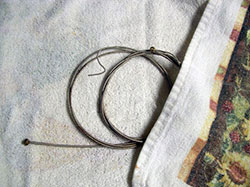
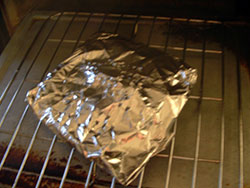








All the Americans whining about saving "a few bucks" on their beginner-range EB super slinkies...a decent set of strings for a 5 string bass sets me back 55-65€. So it's worth prolonging their lifespan if it's an option.
"...another risk to boiling guitar strings too many times is that they will require more tension to stay in tune, possibly causing damage to the neck of your guitar."
This is superstitious baloney. String pitch is based on tension divided by mass (Physics 101). Unless boiling is magically adding mass to your string, then there is no need to be concerned here.
And decreased tensile string does NOT mean increased tension is required; it just means your strings might be more prone to break or stretch. And if they stretch, then that's LESS mass per inch of string and would require LOOSENING the strings to keep them in tune.
EVH never used olive oil
I’m not sure where the idea that EVH boiled his strings in olive oil or that Ernie Ball sent him pre-boiled strings every night for shows came from. Neither is true. There is no interview or any evidence that supports that either thing ever happened. Edward and his tech Rudy Leiren gave specific details about the process that they used for boiling strings in recently unearthed uncut audio interviews, but they specified that they boiled them in water only for 20 minutes, dried them in the sun and then put them on Eddie’s Floyd Rose equipped guitars only. This process was not done for the standard Fender vibrato equipped guitars that Eddie used from 1976 through early 1980 or for stop tail Gibson style guitars like his Ibanez Destroyer.
boiling bass strings
sure, boiled em plenty o'times. delouses em but good. but if i had the cash, i would have bought new strings.
Guitar string
I played off and on for many years does anybody really make a good guitar string anymore it seems lately that after you stretch the string several times you still have to keep it in tune maybe I'm heavy-handed I don't know I'll try boy on them to see what happens my only question is how long do you boil them dude boiling for 1 minute 5 minutes or more than 5 minutes a suggestions thank you
You don't just boil your strrings; you cook them with detergent!
The point is to remove all the accumulated grease from your fingers!
Seems to me if Eddie Van Halen boiled his strings it was more for his tone he was such a tone junkie anybody that knows music can tell that from all of his cool sounds on his guitar probably the best tone junkie that ever lived!!!
Seems to me if Eddie Van Halen boiled his strings it was more for his tone he was such a tone junkie anybody that knows music can tell that from all of his cool sounds on his guitar probably the best tone junkie that ever lived!!!
Manufacturers
I am just wondering, if it is beneficial to boil new strings, the manufacturers (at least of the higher end strings) do not do that prior to packaging.
I would think it would better to dry the strings with a hair dryer or something like that than an oven. Has anyone done that instead of baking the strings? Just seems to me that the oven is a little harsh on the strings even though they are in foil.
Unkind Comments and Olive Oil
It IS kind of a strange topic, kind of "woo woo", so I guess that accounts for some of the unusual comments. Personally, I haven't seen anything here I consider untoward.
I am interested in the EVH olive oil thing. Anybody tried this? Is it for real, does it work? Aha, I see Eric O Campo has done this. Anybody else? (Looking for consensus, nothin' personal Eric. Heh heh...)
people asking WHY we do this may like to know:
outside USA new sets of bass strings are 35 dollars, which are equivalent to a week of work with OUR wages.
So, with that we cannot afford to buy the wrong set... So today Dec 1st I boiled my bass strings (the same that came on my 2016 bass) because I want exactly those same strings and havent found what manufacturer they are (black thread on both ends)
once i figure out,i will gladly replace them with identical ones.
Do people really do this?
This seems like such a pain in the ass for such a small return on your time. How many here truly do this religiously? A set of EB Cobalts is about $8. If the strings get old, just save the hassle and get new strings. Any benefit from boiling new strings has got to be minimal. Yeah, EVH did it, but EVH also had techs that would do it for him. I heard he would get freshly boiled EB strings sent to him before each gig. EB was sending those strings to him; he wasn't boiling them himself.
Shipper
Hello, gang. I have a question. With new guitar strings, I understand that boiling them will essentially help the strings stretch and allow for reduced tuning instability the first few days of use. But is it any better than, say, stretching the string manually while stringing the guitar? My practice has been to put on a new string, bring it to close to normal tension (i.e., tune a high E to Around the B or C 4-5 half steps below), then stretch the string by pulling on it at the 5th fret, 12th fret, and between the pickups. Then I’d tune to proper pitch (high E) and do it one more time. I get no tuning instability when I do this and my fingers can tell when I’ve stretched the strings enough. I’m guessing boiling allows for more equal stretching across the length of the string instead just in the 3 segments of the string I tug on? Does boiling new strings stretch them better, or does it just make manual stretching unnecessary but not necessarily stretch them better? (I’m talking about brand new, high-end strings that won’t be dirty or oily.) Thanks!!
I'm with Sonny on his May 3rd 2019 post. I boiled mine to make them expand. After installing, it took alot less piddling around with physical stretching while tuning and less tune-up on the fly.
Purchased an old chinese copy guitar bonplay. it's a bc rich warlock copy. as soon as I plugged it in it had an interesting "metal" tone. kind of like a detuned church organ. the strings are rusted, but light and springy. this happened with another older guitar I had. my other idea was realloying them somehow, but glad this is a thing. can just refresh them and see how it goes.
My understanding was that you would boil new guitar strings to keep them from going out of tune. You would have to change them more often, even nightly, but they would stay in tune for the big show. Had nothing to do with renewing old strings.
Looking for a black pick guard for a 1959 electric Gibson ts335 any ideas
I usually coil the strings and swish in a glass (50ml cold) of surgical alcohol (from the pharmacy-although Irish whiskey is by far the best), then boil and add to 200ml water on the stove 10 mins max.
This will liven (brighten) up even the oldest strings.
But don't expect great longevity from old strings.
Eventually you gotta buckle down and buy new ones ... the heavier gauge the better. Good luck from Greeno and The 50 Men
No sarcasim towards anyone.just trying to help.Cheers n best to ya all..